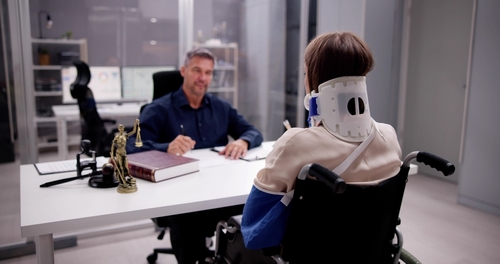Workers’ compensation in Illinois is a system designed to provide financial and medical benefits to employees who suffer injuries or illnesses directly related to their jobs. At its core, this system operates as a form of insurance, offering protection to workers while also limiting the liability of employers. Workers’ compensation is fairly straightforward: employees who are injured or fall ill due to their work are entitled to receive certain benefits, regardless of who was at fault for the injury or illness. This approach contrasts sharply with the traditional legal process, where proving fault or negligence is often a prerequisite for receiving compensation.
Workers’ compensation serves as a crucial safety net, ensuring that employees do not face financial ruin due to work-related injuries or illnesses. This system helps cover medical expenses, lost wages, and rehabilitation costs, providing much-needed support during recovery. Moreover, it offers peace of mind to workers, knowing that they have some level of protection against the unforeseen risks inherent in many jobs. From an employer’s perspective, workers’ compensation provides a degree of predictability and security, as it precludes the possibility of costly personal injury lawsuits that could arise from workplace accidents.
The history of workers’ compensation legislation in Illinois is a testament to evolving labor laws and the growing recognition of workers’ rights. Illinois enacted its first Workers’ Compensation Act in 1911, following a wave of industrial accidents and growing public awareness of the risks faced by workers.
This initial legislation laid the groundwork for the current system, although it has undergone numerous amendments and revisions to address the changing nature of work and the needs of both employees and employers. Over the years, the Illinois Workers’ Compensation Act has expanded in scope, refining the definitions of what constitutes a work-related injury, streamlining the claims process, and adjusting benefit levels to reflect economic changes.
This introduction sets the stage for a deeper exploration into the specifics of the Illinois statute of limitations on workers’ compensation. Understanding this historical and functional context is essential for comprehending the nuances of current legislation and its impact on both workers and employers in Illinois.
Understanding the Statute of Limitations in Illinois Workers’ Compensation
The concept of a statute of limitations is critical in the realm of workers’ compensation, particularly in Illinois. The statute of limitations refers to the specific time period within which an injured worker must file a claim to receive workers’ compensation benefits. This legal framework is not unique to workers’ compensation but is a common feature in various legal processes designed to ensure timeliness and fairness in the pursuit of legal remedies.
In the context of workers’ compensation in Illinois, the statute of limitations sets a definitive timeline that dictates how long employees have to initiate a claim following a work-related injury or diagnosis of a job-related illness. Understanding this timeline is crucial for both employees and employers, as it directly impacts the eligibility for compensation.
In Illinois, the general timeline for filing a workers’ compensation claim is two years from the date of the injury or the last date of compensable benefits received. However, this can vary depending on specific circumstances, such as the nature of the injury or the discovery of an occupational disease.
The reasons for implementing a statute of limitations in workers’ compensation cases are manifold. Firstly, it encourages prompt reporting and filing of claims, which is often in the best interest of all parties involved. Immediate reporting allows for a more accurate assessment of the injury and its relation to the workplace, which is crucial for determining the legitimacy of a claim. Moreover, this promptness ensures that medical evidence remains fresh and reliable, aiding in the fair adjudication of claims.
Additionally, the statute of limitations serves to provide a degree of legal and financial stability for employers and insurance providers. Defining a clear timeframe for filing claims helps prevent the uncertainty and potential financial strain of indefinite liability. This aspect is particularly important in managing and underwriting workers’ compensation insurance policies, as it allows for more accurate risk assessment and financial planning.
In summary, the statute of limitations in workers’ compensation cases in Illinois is a key legal principle that balances the need for timely justice for injured workers with the practical necessities of employers and insurers. Understanding this timeline and its underlying reasons is essential for anyone involved in the workers’ compensation process in Illinois.
Specifics of Illinois Workers’ Compensation Statute of Limitations
The specifics of the statute of limitations for workers’ compensation in Illinois are nuanced and vital for both employees and employers to understand. The time limits set for filing a workers’ compensation claim are not merely bureaucratic formalities; they are legal requirements that can significantly impact the ability of an injured worker to receive benefits.
Detailed Explanation of Time Limits for Filing a Claim in Illinois
In Illinois, the standard time limit for filing a workers’ compensation claim is two years from the date of the injury or the date of the last compensation payment, whichever is later. This timeline is crucial to adhere to, as failing to file within this period typically results in the forfeiture of the right to claim workers’ compensation benefits. This two-year limit is in place to ensure that claims are made while evidence and memories are still fresh, thus enabling a more accurate assessment of the claim.
However, it’s important to note that this two-year period does not start until the employee knows, or should have known, about the injury and its connection to their employment. This distinction is particularly relevant in cases of occupational diseases or cumulative trauma injuries, where symptoms may not become apparent until long after the initial exposure or injury.
Exceptions to the Standard Time Limits
There are exceptions to these standard time limits. For instance, if an employer fails to report an injury to the Illinois Workers’ Compensation Commission (IWCC), the statute of limitations may be extended. Additionally, in cases involving minors, the time limits may not begin until the employee reaches the age of majority.
Another notable exception is for certain occupational diseases, particularly those that develop over time, such as mesothelioma from asbestos exposure. In these cases, the statute of limitations may begin from the date the employee knew or should have known about the disease and its relation to their employment.
Impact of Delayed Reporting on Workers’ Compensation Claims
Delayed reporting of a workplace injury can significantly impact a workers’ compensation claim in Illinois. Failing to report an injury to the employer within 45 days can jeopardize a claim, although this does not affect the two-year limit for filing with the IWCC. However, delays in reporting can lead to skepticism regarding the legitimacy of the claim, potentially complicating the approval process.
Moreover, delayed reporting can hinder accurately assessing the injury and its causes. As time passes, evidence may become less reliable, and the connection between the injury and the workplace may become harder to establish. This can lead to disputes over the validity of the claim, potentially resulting in denials of benefits or prolonged legal battles.
In conclusion, understanding the specific time limits and exceptions for filing workers’ compensation claims in Illinois is crucial. Both employees and employers must be aware of these timelines to ensure that claims are handled promptly and fairly. Delays in reporting or filing can have significant consequences, potentially affecting the outcome of a claim and the benefits an injured worker may receive.
Legal Process and Claimant Actions in Illinois Workers’ Compensation Claims
Navigating the legal process of filing a workers’ compensation claim in Illinois requires a clear understanding of the necessary steps, the roles of various parties involved, and the legal rights and responsibilities of the claimant. In some cases, the complexity of these claims underscores the necessity of legal representation.
Steps to File a Workers’ Compensation Claim in Illinois
The first step in filing a workers’ compensation claim in Illinois is for the injured worker to report the injury to their employer as soon as possible, ideally within 45 days. This notification should be in writing, providing details about the injury and how it occurred. Following this, the employer is required to report the injury to the Illinois Workers’ Compensation Commission (IWCC) if the injury has resulted in more than three lost workdays.
The claimant must then file a claim with the IWCC, which involves submitting the Application for Adjustment of Claim form. This formalizes the claim and sets the legal process in motion. Claimants need to keep detailed records of their injuries, medical treatments, and any communication with their employer or the employer’s insurance company.
Role of Employers and Insurance Companies in the Claims Process
Employers play a critical role in the workers’ compensation claims process. Once notified of an injury, they must provide the claimant with a list of approved healthcare providers if they have a Preferred Provider Program. Employers are also responsible for filing a report of the injury with the IWCC and their workers’ compensation insurance company.
The insurance company then assesses the claim to determine eligibility for benefits. This assessment includes reviewing medical records, the circumstances of the injury, and any other relevant information. The insurance company may approve or deny the claim, or it might require additional information or investigations.
Legal Rights and Responsibilities of the Claimant
Claimants have specific rights in the workers’ compensation process. They have the right to seek medical treatment, to be represented by an attorney, and to a fair hearing before the IWCC if the claim is disputed. Claimants are also responsible for complying with all procedural requirements, including timely reporting of the injury and submission of necessary documentation.
Necessity of Legal Representation
The complexity of workers’ compensation laws and the potential for disputes with employers or their insurance companies often make legal representation necessary. A lawyer experienced in workers’ compensation can help navigate the legal system, ensure that all deadlines are met, and represent the claimant in hearings or appeals. Legal representation is particularly vital in cases where the claim is denied, benefits are disputed, or the injury is severe, leading to long-term disability or complex medical needs.
The process of filing a workers’ compensation claim in Illinois involves several steps and requires an understanding of the roles and responsibilities of all parties involved. Legal representation can play a critical role in ensuring that the rights of the claimant are protected and that they receive the benefits to which they are entitled.
Speak With Our Cook County Workers’ Compensation Attorney Today!
Over the past 20 years, Bob has encountered many people who have suffered from all types of work-related injuries and failed to get the “right” legal advice. Some of these people haven’t gone to a lawyer because they didn’t know they have the right to compensation. Some people are intimidated by meeting with an attorney.
They don’t want to file a workers’ compensation claim because they think that they might lose their jobs, their health insurance benefits, or the time they have put into the company, losing their pension. None of which are true!
Were you injured in an accident caused by the negligence of another? Contact our Antioch workers’ compensation attorney today for your free case evaluation. For immediate assistance, call The Law Office of Robert T. Edens at (847) 395-2200.





 is a no-fault law designed to aid workers in the state by assisting them in their employment. While it can cover your medical bills and other expenses as you recuperate from a work-based injury, please take advantage of it at your own risk. Attending school while you are on the benefits is ill-advised.
is a no-fault law designed to aid workers in the state by assisting them in their employment. While it can cover your medical bills and other expenses as you recuperate from a work-based injury, please take advantage of it at your own risk. Attending school while you are on the benefits is ill-advised. Insurance carriers are highly experienced in reducing workers’ compensation injuries, so they can either deny a claim or pay less. One of the tools they can use to discredit claimants is medical providers who can give biased opinions to minimize injuries.
Insurance carriers are highly experienced in reducing workers’ compensation injuries, so they can either deny a claim or pay less. One of the tools they can use to discredit claimants is medical providers who can give biased opinions to minimize injuries. A work injury, or even an occupational disease, can disrupt your life, health, finances, and overall wellbeing for years. Workers’ compensation is an insurance system designed to compensate you for these losses if you are injured in a workplace accident. The benefits or payout you receive will depend on your existing condition and wages before you were injured.
A work injury, or even an occupational disease, can disrupt your life, health, finances, and overall wellbeing for years. Workers’ compensation is an insurance system designed to compensate you for these losses if you are injured in a workplace accident. The benefits or payout you receive will depend on your existing condition and wages before you were injured. Your employer’s insurance company typically offers
Your employer’s insurance company typically offers  Worker’s comp insurance in Illinois covers expenses for employees if they are injured on the job or fall ill during their work duties. The coverage can pay for your medical bills and replace most of the wages you may lose as you recuperate. However, not every employee is eligible for compensation.
Worker’s comp insurance in Illinois covers expenses for employees if they are injured on the job or fall ill during their work duties. The coverage can pay for your medical bills and replace most of the wages you may lose as you recuperate. However, not every employee is eligible for compensation. If you have suffered a work-related injury and have filed for worker’s comp, you will need to undergo an independent medical exam with an approved doctor. However, keep in mind that the insurance company pays these doctors. As such, they may try to reduce costs for the
If you have suffered a work-related injury and have filed for worker’s comp, you will need to undergo an independent medical exam with an approved doctor. However, keep in mind that the insurance company pays these doctors. As such, they may try to reduce costs for the 
